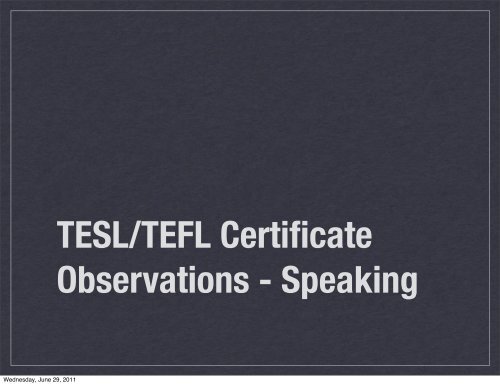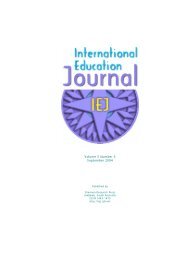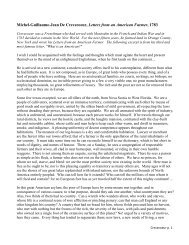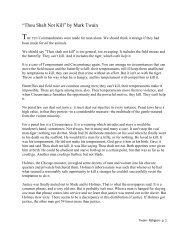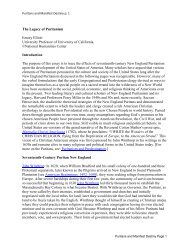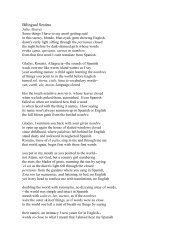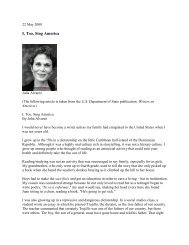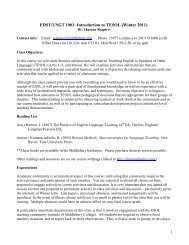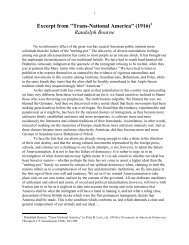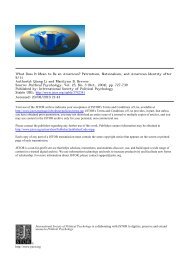Speaking - Shawna Shapiro
Speaking - Shawna Shapiro
Speaking - Shawna Shapiro
Create successful ePaper yourself
Turn your PDF publications into a flip-book with our unique Google optimized e-Paper software.
TESL/TEFL Certificate<br />
Observations - <strong>Speaking</strong><br />
Wednesday, June 29, 2011
The basics<br />
The teacher should be talking 50% of the time<br />
All students should be talking 50% of the time<br />
All communication should be meaningful<br />
At any point in a given class, the teacher should<br />
be able to tell me why they are doing a specific<br />
activity<br />
Prioritize pair/group work<br />
Wednesday, June 29, 2011
The basics, con’t<br />
Every activity should have a schema-activation<br />
exercise.<br />
For every activity, students should be told why<br />
they are doing a given activity.<br />
Process of working with a given activity involves<br />
input, controlled practice, open-ended practice.<br />
Get students used to the idea that they don’t need<br />
to understand 100% of the input to participate.<br />
Wednesday, June 29, 2011
From Input to Output<br />
Bill Van Patten<br />
Context-rich input<br />
Controlled practice<br />
Open-ended, focused<br />
practice<br />
Focus: What am I<br />
teaching?<br />
Wednesday, June 29, 2011
Stephen Krashen<br />
Monitor Model (1982)<br />
The Natural Approach<br />
Wednesday, June 29, 2011
Acquisition vs. Learning<br />
Acquisition occurs through the subconscious<br />
"picking-up" of the characteristics.<br />
Eventually results in spontaneous communication<br />
in real contexts.<br />
Consciously focusing on the rules of the language<br />
may result in learning, but not true acquisition.<br />
Contextualized instruction where students<br />
themselves notice language patterns.<br />
Wednesday, June 29, 2011
Acquisition vs. Learning<br />
Contextualized instruction where students<br />
themselves notice language patterns, rather than<br />
explicit grammar instruction, is ideal.<br />
Inductive (discover the rule) vs. deductive<br />
Requires cognitive investment on the part of the<br />
learner<br />
Learning takes place in a far richer context<br />
Wednesday, June 29, 2011
The Input Hypothesis<br />
Acquisition occurs when learners receive<br />
comprehensible input.<br />
Comprehensible input is described as input just<br />
beyond the learners current level of competence (i<br />
+1).<br />
Input can be made comprehensible through<br />
background knowledge, context clues, visual aids,<br />
gestures or other extralinguistic cues.<br />
Wednesday, June 29, 2011
The Input Hypothesis<br />
Input should be meaningful and relevant to the<br />
second language learner.<br />
Rely on background knowledge to interpret<br />
meaning (schema activation).<br />
Context, context, context...<br />
Wednesday, June 29, 2011
Wednesday, June 29, 2011<br />
Really?
Comprehensible Output<br />
Merrill Swain<br />
Canadian immersion<br />
programs<br />
Listening vs. speaking<br />
proficiency<br />
Wednesday, June 29, 2011
Comprehensible Output<br />
Learning takes place when encountering a gap in<br />
the linguistic knowledge of the L2.<br />
CO facilitates second language learning in ways<br />
that differ from and enhance input due to the<br />
mental processes connected with the production<br />
of language.<br />
Related to the Noticing Hypothesis of Richard<br />
Schmidt (1990)<br />
Wednesday, June 29, 2011
Functions of output:<br />
Noticing<br />
Noticing function: Learners encounter gaps<br />
between what they want to say and what they are<br />
able to say and so they notice what they do not<br />
know or only know partially in this language.<br />
Wednesday, June 29, 2011
Functions of output:<br />
Hypothesis testing<br />
When learners say something there is always an<br />
underlying hypothesis, for example, about<br />
grammar.<br />
By uttering something, the learners test this<br />
hypothesis and receive feedback from an<br />
interlocutor.<br />
This feedback enables them, if necessary, to<br />
reprocess their hypothesis.<br />
Wednesday, June 29, 2011
Functions of output:<br />
Metalinguistic function<br />
Learners reflect about the language they learn and<br />
hereby the output enables them to control and<br />
internalize linguistic knowledge.<br />
Wednesday, June 29, 2011
How do you teach this?<br />
We had a great time!<br />
1<br />
SNAPSHOT<br />
Complete these tasks and talk about them.<br />
Which of these activities do you do every day?<br />
List three other activities you like to do almost every day.<br />
Put the activities you do in order: from the most interesting to the least interesting.<br />
Source: University of Michigan,<br />
Institute for Social Research<br />
2<br />
Wednesday, June 29, 2011<br />
CONVERSATION The weekend
Application<br />
Schema activation<br />
Input<br />
6163 NIC/SL07.27 2/10/00 10:35 AM Page 40<br />
Structured output: T<br />
gives percentages and<br />
students give activities<br />
1<br />
SNAPSHOT<br />
We had a great time!<br />
Wednesday, June 29, 2011<br />
What OPI level of<br />
language does this<br />
require?<br />
2<br />
Complete these tasks and talk about them.<br />
Which of these activities do you do every day?<br />
List three other activities you like to do almost every day.<br />
Put the activities you do in order: from the most interesting to the least interesting.<br />
CONVERSATION The weekend<br />
A ` Listen and practice.<br />
Chris: So, what did you do this weekend, Kate?<br />
Kate: Oh, Diane and I went for a drive in the<br />
country on Saturday.<br />
Chris: That sounds nice. Where did you go?<br />
Kate: We drove to the lake and had a picnic.<br />
We had a great time! How about you?<br />
Did you do anything special?<br />
Chris: Not really. I just worked on my car<br />
all day.<br />
Kate: That old thing! Why don’t you just<br />
buy a new one?<br />
Chris: But then what would I do every weekend?<br />
Source: University of Michigan,<br />
Institute for Social Research


